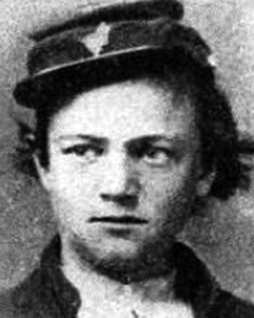|
Horsfall was among many youngsters
who answered Civil War’s call to arms
With hopes of adventure and glory, tens of thousands of boys under the age of 18 answered the call of the Civil War, many of them rushing to join Union and Confederate troops in the earliest days of battle.
Fourteen-year-old William Horsfall was one of those youngsters and lived to be recognized as one of the youngest recipients of the Congressional Medal of Honor.
The Newport youth and three friends stowed away on a steamship bound for a Union regiment in the early days of the war. At the last minute, Horsfall’s companions had a change of heart and ran ashore as the ship prepared to leave the Cincinnati wharf.
In his personal account from the Campbell County Historical Society archives, Horsfall described how he “left home without money or a warning to (his) parents” and “stealthily boarded the steamer, Annie Laurie, moored at the Cincinnati Wharf at Newport (on) the 20th of December 1861.”
The stowaway stayed hidden “until the boat was well under way.” When Horsfall was discovered, he said he was an orphan and was allowed to remain on board.
Months later, at age 15, Horsfall – listed as a drummer boy in Company G, First Regiment Kentucky Volunteers – saved the life of his wounded commanding officer when he was trapped between the lines at Corinth, Miss. At the time of his enlistment, Horsfall stood 4-foot-3 and listed his occupation as “schoolboy.”
During the Siege of Corinth on May 21, 1862, Horsfall, who then described himself as “an independent sharpshooter,” recounted how a Union captain was wounded in “a desperate charge across (a) ravine,” and left between the lines.
Horsfall was told that a Capt. Williamson needed to be rescued if at all possible.
“So I placed my gun against a tree and, in a stooping run, gained his side and dragged him to the stretcher bearers, who took him to the rear,” Horsfall said.
The drummer boy continued to take part in marches with his regiment for the rest of 1862. During the charge at Stones River near Murfreesboro, Tenn., Horsfall was surrounded by hostile infantry, but the Rebels “took pity on his youth,” enabling him “to run for his life,” he later wrote.
About a year after enlisting, Horsfall became so ill that he had to be hospitalized. Twice in the next three years, he re-enlisted, before receiving a $400 bounty upon his final discharge in 1866.
After the war, Horsfall tried to join a volunteer fire department in his native Northern Kentucky, “but he was turned away because he was too young.” By age 46, Horsfall’s rheumatism and heart disease had become so bad that he required a live-in caretaker.
Horsfall received his first Medal of Honor on Aug. 17, 1895. A second medal was presented for the same citation in 1904 when the design was changed.
After the war, Horsfall commanded the William Nelson Post Grand Army of the Republic of Newport and published several songs and war poems. But it was his teen-aged act of heroism that remained his claim to fame.
The once-young hero died at age 75 in 1922. Today, a rare historical marker stands near his grave in Evergreen Cemetery in Southgate.
Both the Union and Confederacy had recruitment rules that barred underage men from enlisting, but that didn’t stop those who wanted to be part of the action. Some enlisted without their parents’ permission and lied about their ages or bargained with recruiters for a trial period, while others joined along with their older brothers and fathers whose partisan passions overwhelmed their parental senses. Most of the youngest boys became drummers, messengers and orderlies, but thousands of others fought alongside the men.
As each side scrambled to get troops into the field in the early days of the war, many of the boys went to battle with just a few weeks of training. It didn’t take long, however, for them to understand the situation they had entered.
|









